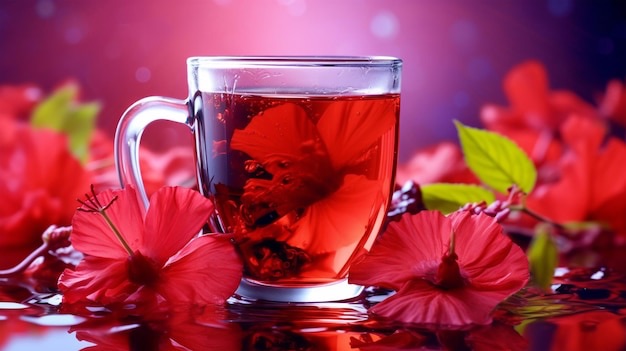
By Prof. Raphael Nyarkotey Obu
Tea is not only a refreshing drink but is a host to many health. Waking up in the morning and drinking tea is a ritual in the Indian household. Research says that habitual tea drinkers enjoy a longer life.
Several studies have found that Asians live longer due to their dependency on drinking their herbal teas( alimentarium.org, 2023; Sharma and Diwan, 2022; Ruan et al, 2013; CNN. Com, 2022; Pan et al. 2022).
We can incorporate their models into our lifestyle. We have one of the best herbal teas in the world. Hibiscus tea has been proven in both human and animal studies(Lima et al. 2022; Edo et al. 2023; Eliss et al. 2022; Jalalyazdi et al. 2019; express.co.uk, 2021; Etheridge and Derbyshire, 2020; Koch et al. 2020) to support hypertension, diabetes, and many more. I have written several articles on this plant.
In this article, I examine the impact of drinking hibiscus tea on longevity.
Hibiscus tea, science
Longevity
In this study, Koch et al. (2020) found that drinking hibiscus tea resulted in a prominent extension of lifespan (up to 24%). Hence, we can also live longer by drinking hibiscus tea(Koch et al. 2020).
A recent study by Lima et al. (2022) study also found that drinking hibiscus tea improves life span by averting free radicals.
A previous study(Ali et al. 2020) found that antioxidants help protect against compounds called free radicals, which can damage your cells.
A previous study in people with Marfan syndrome by Soto et al.(2016) found that hibiscus has powerful antioxidants and could avert damage and disease caused by the buildup of free radicals.Marfan syndrome, a disorder that affects connective tissue, found that an infusion of hibiscus extract reduced oxidative stress and increased antioxidant levels in the blood.
A previous animal study by Gheller et al.(2017) found that hibiscus extract helped protect against cell damage in rats.
Blood Pressure
Most of the studies on hibiscus are on blood pressure. For instance, in one small study( Jalalyazdi et al. 2019), 46 people with high blood pressure consumed either hibiscus tea or a placebo. After 1 month, those who drank hibiscus tea had a greater decrease in systolic and diastolic blood pressure than those who took the placebo.
A previous review study by Serban et al.(2015) using five studies found that hibiscus tea decreased systolic and diastolic blood pressure by an average of 7.58 millimeters of mercury (mm Hg) and 3.53 mmHg, respectively.
Medlineplus.gov, reports that hibiscus tea may be a safe and natural way to help lower blood pressure, however, it is not recommended for those who are taking medications to treat high blood pressure, as it may interact with these drugs.
Improve blood fat levels
Apart from decreasing blood pressure, Soppert et al.(2020) study found that hibiscus tea could help improve blood fat levels, which can be another risk factor for heart disease.
A previous small study( Mozaffari-Khosravi et al. 2009) used 60 people with diabetes who consumed either hibiscus tea or black tea. After 1 month, those who drank hibiscus tea had increased levels of HDL (good) cholesterol and decreased levels of total cholesterol, LDL (bad) cholesterol, and triglycerides.
Another older study( Gurrola-Díaz CM et al. 2010) in people with metabolic syndrome found that taking 100 milligrams of hibiscus extract daily was linked to decreased total cholesterol and increased HDL cholesterol.
A recent review(Ellis et al. 2022) found that hibiscus tea could decrease levels of LDL cholesterol more effectively than other types of tea or a placebo.
However, other studies have produced mixed results on hibiscus tea’s effects on blood cholesterol.
A previous review of 7 studies( Boushehri et al. 2020) using a total of 362 participants found that hibiscus tea did not significantly reduce total cholesterol or triglyceride levels.
Most studies showing the benefit of hibiscus tea on blood fat levels have been limited to people with specific health conditions, such as metabolic syndrome and diabetes.
We need large-scale studies examining the effects of hibiscus tea on blood cholesterol and triglyceride levels to determine its potential effects in the general population.
boost liver health
studies have shown that hibiscus may promote liver health and help keep your liver working efficiently.
A small study by Chang et al.(2014) on 19 people with overweight found that taking hibiscus extract for 12 weeks improved liver steatosis. This condition is characterized by the accumulation of fat in the liver, which can lead to liver failure.
Another study by Huang et al.(2015) in hamsters also found that hibiscus protects the liver.
A recent animal study by Prasomthong et al.(2022) reported that hibiscus extract helped improve fatty liver disease in rats fed a high-fat diet. The other aspect is that the studies used hibiscus extract rather than hibiscus tea.
Promote weight loss
Several studies suggest that hibiscus tea may be associated with weight loss and could help protect against obesity.
In one small 2014 study(Chang et al. 2014), 36 participants with overweight took either a hibiscus extract or a placebo. After 12 weeks, those who had taken hibiscus extract had reductions in body weight, body fat, body mass index, and waist-to-hip ratio.
A recent animal study(Janson et al. 2021) had the same reports, recommending that hibiscus extract could help decrease body weight and appetite by preventing the accumulation of fat cells. Recent studies are limited to concentrated doses of hibiscus extract.
Prevent cancer
Some studies(Laskar et al. 2020; Zhou et al. 2016) found that hibiscus is high in polyphenols, compounds found to possesspowerful anticancer properties.
Another test-tube study( Malacrida et al. 2016) found that hibiscus extracts impaired cell growth and decreased the invasiveness of mouth and plasma cell cancers.
Another test-tube study(Chiu et al 2015 ) found that hibiscus leaf extract prevented human prostate cancer cells from spreading.
Other studies(Nguyen et al. 2019; Wang et al. 2019; Chiu et al. 2015) also found that hibiscus extract and its compounds found to inhibit the growth of other types of cancer cells in test-tube studies, including breast, stomach, and skin cancers.
However, these were test-tube studies using large amounts of hibiscus extract. Research in humans is needed to evaluate the potential effect of hibiscus tea on cancer.
Decrease the growth of bacteria
Bacteria are single-celled microorganisms that can cause a variety of infections, such as bronchitis, pneumonia, and urinary tract infections.
One test-tube study(Mohamed-Salem et al. 2019) found that hibiscus extract inhibited the activity of E. coli, a strain of bacteria that can cause symptoms such as cramping, gas, and diarrhea.
A previous test-tube study( Abdallah EM, 2016) found that the extract fought eight strains of bacteria and was as effective as some medications used to treat bacterial infections. However, human studies are needed.
Prof. Nyarkotey has strict sourcing guidelines and relies on peer-reviewed studies, academic research institutions, and medical associations to justify his write-ups. My articles are for educational purposes and do not serve as Medical advice for Treatment. I aim to educate the public about evidence-based scientific Naturopathic Therapies.
The writer is a Professor of Naturopathic Healthcare, a Medical Journalist, and a science writer. President, NyarkoteyUniversity College of Holistic Medicine & Technology (NUCHMT)/African Naturopathic Foundation, Ashaiman, Ghana. E. mail: professor40naturopathy@gmail.com. Visit-profnyarkotey.com for more.
Nyarkotey Herbal Mall has been set up to house quality natural products from all over the world. You can now buy all your vitamins, herbs, supplements, homeopathy drugs, Ayurveda drugs and more. It is located at Amrahia, Dodowa Road, behind Potbelly. We have qualified Naturopathic doctors managing the Natural Medicine Mall. We do deliveries as well. Call on: +233207844338/0541090045. Special consultation is also available for diabetics, hypertensive and cancer patients, and many more
References
1. Koch K, Weldle N, Baier S, Büchter C, Wätjen W. Hibiscus sabdariffa L. extract prolongs lifespan and protects against amyloid-β toxicity in Caenorhabditis elegans: involvement of the FoxO and Nrf2 orthologues DAF-16 and SKN-1. EurJ Nutr. 2020 Feb;59(1):137-150. doi: 10.1007/s00394-019-01894-w. Epub 2019 Feb 1. PMID: 30710163.
2. Ali SS, Ahsan H, Zia MK, Siddiqui T, Khan FH. Understanding oxidants and antioxidants: Classical team with new players. J Food Biochem. 2020 Mar;44(3):e13145. doi: 10.1111/jfbc.13145. Epub 2020 Jan 20. PMID: 31960481.
3. Nogueira Silva Lima, M.T.; Boulanger, E.; Tessier, F.J.; Takahashi, J.A. Hibiscus, Rooibos, and Yerba Mate for Healthy Aging: A Review on the Attenuation of In Vitro and In Vivo Markers Related to Oxidative Stress, Glycoxidation, and Neurodegeneration. Foods 2022, 11, 1676. https://doi.org/10.3390/foods11121676.
4. Soto ME, Zuñiga-Muñoz A, Guarner Lans V, Duran-Hernández EJ, Pérez-Torres I. Infusion of Hibiscus sabdariffa L. Modulates Oxidative Stress in Patients with Marfan Syndrome. Mediators Inflamm. 2016;2016:8625203. doi: 10.1155/2016/8625203. Epub2016 Jun 16. PMID: 27413258; PMCID: PMC4927999.
5. Gheller AC, Kerkhoff J, Vieira Júnior GM, de Campos KE, Sugui MM. Antimutagenic Effect of Hibiscus sabdariffa L. Aqueous Extract on Rats Treated with Monosodium Glutamate. ScientificWorldJournal. 2017;2017:9392532. doi: 10.1155/2017/9392532. Epub 2017 Jan 19. PMID: 28197528; PMCID: PMC5288558.
6. Jalalyazdi M, Ramezani J, Izadi-Moud A, Madani-Sani F, Shahlaei S, Ghiasi SS. Effect of hibiscus sabdariffa on blood pressure in patients with stage 1 hypertension. J AdvPharm Technol Res. 2019 Jul-Sep;10(3):107-111. doi: 10.4103/japtr.JAPTR_402_18. PMID: 31334091; PMCID: PMC6621350.
7. Serban C, Sahebkar A, Ursoniu S, Andrica F, Banach M. Effect of sour tea (Hibiscus sabdariffa L.) on arterial hypertension: a systematic review and meta-analysis of randomized controlled trials. J Hypertens. 2015 Jun;33(6):1119-27. doi: 10.1097/HJH.0000000000000585. PMID: 25875025.
8. Soppert J, Lehrke M, Marx N, Jankowski J, Noels H. Lipoproteins and lipids in cardiovascular disease: from mechanistic insights to therapeutic targeting. Adv Drug Deliv Rev. 2020;159:4-33. doi: 10.1016/j.addr.2020.07.019. Epub 2020 Jul 27. PMID: 32730849.
9. Mozaffari-Khosravi H, Jalali-Khanabadi BA, Afkhami-Ardekani M, Fatehi F. Effects of sour tea (Hibiscus sabdariffa) on lipid profile and lipoproteins in patients with type II diabetes. J Altern Complement Med. 2009 Aug;15(8):899-903. doi: 10.1089/acm.2008.0540. PMID: 19678781.
10. Gurrola-Díaz CM, García-López PM, Sánchez-EnríquezS, Troyo-Sanromán R, Andrade-González I, Gómez-Leyva JF. Effects of Hibiscus sabdariffa extract powder and preventive treatment (diet) on the lipid profiles of patients with metabolic syndrome (MeSy). Phytomedicine. 2010 Jun;17(7):500-5. doi: 10.1016/j.phymed.2009.10.014. Epub2009 Dec 3. PMID: 19962289.
11. Lucy R Ellis, Sadia Zulfiqar, Mel Holmes, Lisa Marshall, Louise Dye, Christine Boesch, A systematic review and meta-analysis of the effects of Hibiscus sabdariffa on blood pressure and cardiometabolic markers, Nutrition Reviews, Volume 80, Issue 6, June 2022, Pages 1723–1737.
12. Huang TW, Chang CL, Kao ES, Lin JH. Effect of Hibiscus sabdariffa extract on high fat diet-induced obesity and liver damage in hamsters. Food Nutr Res. 2015 Oct 15;59:29018. doi: 10.3402/fnr.v59.29018. PMID: 26475512; PMCID: PMC4608971.
13. Prasomthong J, Limpeanchob N, Daodee S, Chonpathompikunlert P, Tunsophon S. Hibiscus sabdariffa extract improves hepatic steatosis, partially through IRS-1/Akt and Nrf2 signaling pathways in rats fed a high fat diet. Sci Rep. 2022 Apr 29;12(1):7022. doi: 10.1038/s41598-022-11027-9. PMID: 35487948; PMCID: PMC9054782.
14. Janson B, Prasomthong J, Malakul W, Boonsong T, Tunsophon S. Hibiscus sabdariffa L. calyx extract prevents the adipogenesis of 3T3-L1 adipocytes, and obesity-related insulin resistance in high-fat diet-induced obese rats. Biomed Pharmacother. 2021 Jun;138:111438. doi: 10.1016/j.biopha.2021.111438. Epub 2021 Mar 13. PMID: 33721756.
15. Zhou Y, Zheng J, Li Y, Xu DP, Li S, Chen YM, Li HB. Natural Polyphenols for Prevention and Treatment of Cancer. Nutrients. 2016 Aug 22;8(8):515. doi: 10.3390/nu8080515. PMID: 27556486; PMCID: PMC4997428.
16. Malacrida A, Maggioni D, Cassetti A, Nicolini G, Cavaletti G, Miloso M. Antitumoral Effect of Hibiscus sabdariffa on Human Squamous Cell Carcinoma and Multiple Myeloma Cells. Nutr Cancer. 2016 Oct;68(7):1161-70. doi: 10.1080/01635581.2016.1208830. Epub 2016 Aug 11. PMID: 27618152.
17. Laskar YB, Mazumder PB. Insight into the molecular evidence supporting the remarkable chemotherapeutic potential of Hibiscus sabdariffa L. Biomed Pharmacother. 2020 Jul;127:110153. doi: 10.1016/j.biopha.2020.110153. Epub 2020 Apr 27. PMID: 32344257.
18. Nguyen C, Baskaran K, Pupulin A, Ruvinov I, Zaitoon O, Grewal S, Scaria B, Mehaidli A, Vegh C, Pandey S. Hibiscus flower extract selectively induces apoptosis in breast cancer cells and positively interacts with common chemotherapeutics. BMC Complement Altern Med. 2019 May 6;19(1):98. doi: 10.1186/s12906-019-2505-9. PMID: 31060537; PMCID: PMC6503386.
19. Chiu CT, Chen JH, Chou FP, Lin HH. Hibiscus sabdariffa Leaf Extract Inhibits Human Prostate Cancer Cell Invasion via Down-Regulation of Akt/NF-kB/MMP-9 Pathway. Nutrients. 2015 Jun 24;7(7):5065-87. doi: 10.3390/nu7075065. PMID: 26115086; PMCID: PMC4516987.
20. Wang L, Wang X, Chen H, Zu X, Ma F, Liu K, Bode AM, Dong Z, Kim DJ. Gossypin inhibits gastric cancer growth by direct targeting of AURKA and RSK2. Phytother Res. 2019 Mar;33(3):640-650. doi: 10.1002/ptr.6253. Epub 2018 Dec 10. PMID: 30536456; PMCID: PMC6416069.
21. Mohamed-Salem R, Rodríguez Fernández C, Nieto-Pelegrín E, Conde-Valentín B, Rumbero A, Martinez-Quiles N. Aqueous extract of Hibiscus sabdariffa inhibits pedestal induction by enteropathogenic E. coli and promotes bacterial filamentation in vitro. PLoS One. 2019 Mar 8;14(3):e0213580. doi: 10.1371/journal.pone.0213580. PMID: 30849110; PMCID: PMC6407759.
22. Chang HC, Peng CH, Yeh DM, Kao ES, Wang CJ. Hibiscus sabdariffa extract inhibits obesity and fat accumulation, and improves liver steatosis in humans. Food Funct. 2014 Apr;5(4):734-9. doi: 10.1039/c3fo60495k. Epub 2014 Feb 19. PMID: 24549255.
23. Najafpour Boushehri S, Karimbeiki R, Ghasempour S, Ghalishourani SS, Pourmasoumi M, Hadi A, Mbabazi M, Pour ZK, Assarroudi M, Mahmoodi M, Khosravi A, Mansour-Ghanaei F, Joukar F. The efficacy of sour tea (Hibiscus sabdariffa L.) on selected cardiovascular disease risk factors: A systematic review and meta-analysis of randomized clinical trials. Phytother Res. 2020 Feb;34(2):329-339. doi: 10.1002/ptr.6541. Epub 2020 Jan 14. PMID: 31943427.
24. Abdallah EM. Antibacterial efficiency of the Sudanese Roselle (Hibiscus sabdariffa L.), a famous beverage from Sudanese folk medicine. J Intercult Ethnopharmacol. 2016 Mar 24;5(2):186-90. doi: 10.5455/jice.20160320022623. PMID: 27104041; PMCID: PMC4835995.





